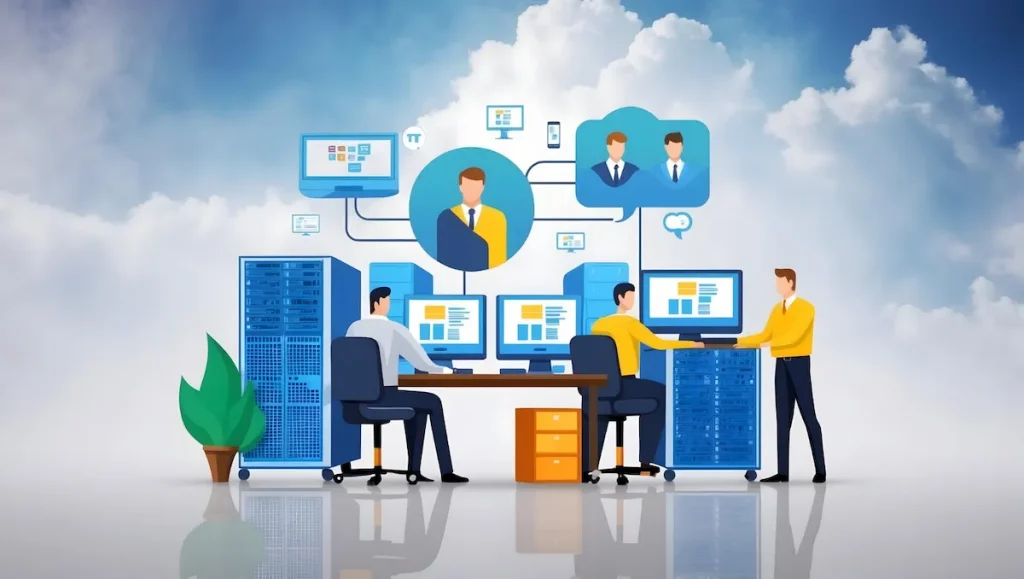When businesses search for ways to streamline operations and reduce technology headaches, one question often comes up: what is managed IT services? In simple terms, managed IT services—or information technology managed services—refer to outsourcing your company’s IT needs to a trusted provider who takes care of everything from system monitoring and cybersecurity to data backups and troubleshooting. This approach is no longer limited to large corporations; today, industries like healthcare, retail, finance, and even small startups rely on managed IT services to stay secure, efficient, and competitive. By letting experts handle complex IT challenges, organizations can free up valuable time and resources to focus on innovation, growth, and delivering better customer experiences.
In this blog, we will explore the key roles within managed services, their responsibilities, and how they contribute to seamless IT management.
What Are Managed Services?
IT support managed services go beyond simple troubleshooting, they involve outsourcing a wide range of IT functions to a trusted Managed Service Provider (MSP). These services often include network monitoring, cybersecurity, cloud management, and disaster recovery. By leveraging IT support and managed services, businesses gain proactive system maintenance, ongoing optimization, and 24/7 monitoring, which helps minimize downtime and strengthen data security.
Instead of stretching internal teams thin, organizations can offload critical IT responsibilities to experts, ensuring smoother operations while keeping costs predictable.
Here’s a quick comparison between maintaining an in-house IT team versus working with MSPs:
| Aspect | In-House IT Team | Managed Service Provider (MSP) |
| Cost | High fixed salaries & overhead costs | Predictable monthly subscription or service fees |
| Expertise | Limited to in-house skills | Access to diverse, specialized IT experts |
| Scalability | Slow to scale, requires new hires | Easily scalable as business needs grow |
| Availability | Standard office hours | 24/7 monitoring and support |
| Focus | Time spent on troubleshooting | Frees business to focus on strategy & growth |
By choosing IT support managed services, companies ensure their technology infrastructure is both reliable and future-ready—without the heavy burden of managing everything internally.
Key Roles in Managed Services
1. Managed Services Account Manager
Responsibilities:
- The Head of IT Managed Services acts as the primary point of contact between the MSP and the client.
- Understand client objectives and align services to meet business goals.
- Provide regular updates, performance reports, and insights.
- Facilitate contract renewals and upsell additional services.
2. IT Service Manager
Responsibilities:
- Oversee the delivery of managed services to ensure alignment with SLAs (Service Level Agreements).
- Monitor service quality and address any performance issues.
- Coordinate between different technical teams to resolve complex problems.
- Implement ITIL (Information Technology Infrastructure Library) practices for effective service management.
3. L1 Technical Support Specialist
Responsibilities:
- Handle initial support requests and basic troubleshooting tasks.
- Resolve common hardware and software issues.
- Escalate unresolved problems to L2 or L3 specialists.
- Document issues and solutions for future reference.
4. L2 Technical Support Specialist
Responsibilities:
- Manage more complex technical issues escalated from L1 support.
- Resolve complex issues with a helpdesk managed service, offering advanced support beyond general IT helpdesk functions.
- Conduct in-depth diagnostics and troubleshooting for network, server, and application problems.
- Collaborate with vendors for issue resolution when needed.
- Provide guidance and training to L1 support staff.
5. L3 Technical Support Specialist
Responsibilities:
- Address the most advanced and critical technical challenges.
- Perform root cause analysis for recurring issues.
- Implement and optimize advanced IT solutions.
- Collaborate with development teams for application debugging and enhancements.
6. Network Engineer
Responsibilities:
- Design, implement, and maintain network infrastructure, including routers, switches, and firewalls.
- Monitor network performance and troubleshoot connectivity issues.
- Plan and execute network upgrades and expansions.
- Ensure the network adheres to security protocols and compliance standards.
7. Cybersecurity Specialist
Responsibilities:
- Protect client systems from cyber threats by implementing robust security measures.
- Conduct regular vulnerability assessments and penetration testing.
- Monitor security logs for suspicious activity.
- Ensure compliance with data protection regulations like GDPR and HIPAA.
8. Cloud Solutions Architect
Responsibilities:
- Design and implement cloud-based solutions tailored to client needs.
- Manage cloud migrations with minimal disruption to business operations.
- Optimize cloud resources for cost efficiency and performance.
- Ensure cloud environments are secure and compliant with standards.
9. Help Desk Support Specialist
Responsibilities:
- Provide first-line support to end-users for technical issues.
- Resolve hardware and software problems through remote or on-site assistance.
- Document and escalate unresolved issues to higher support tiers.
- Offer user training to improve IT literacy and reduce future issues.
10. Backup and Disaster Recovery Manager
Responsibilities:
- Develop and implement data backup strategies to prevent data loss.
- Test disaster recovery plans to ensure business continuity.
- Monitor backup systems for reliability and performance.
- Coordinate recovery efforts in the event of data loss or system failure.
11. IT Consultant
Responsibilities:
- Analyze client IT environments and provide strategic recommendations.
- Identify opportunities for process improvement and cost reduction.
- Advise on the adoption of emerging technologies.
- Assist with compliance audits and IT policy development.
12. Remote Monitoring and Management (RMM) Technician
Managed Service Provider Responsibilities:
- Use RMM tools to monitor client systems in real-time.
- Automate routine tasks such as patch management and software updates.
- Detect and resolve issues proactively to prevent downtime.
- Generate detailed system health reports for clients.
13. Service Desk Manager
Responsibilities:
- Oversee the day-to-day operations of the service desk.
- Ensure tickets are resolved within SLA timeframes.
- Train and mentor help desk staff to improve service quality.
- Analyze ticket trends to identify recurring issues and implement long-term fixes.
Shared Responsibilities Between MSPs and Clients
| MSP Responsibilities | Client Responsibilities |
| Proactively manage IT infrastructure and services | Provide accurate business requirements and goals |
| Ensure data security and compliance | Follow security best practices (passwords, access policies) |
| Provide regular performance reports | Review reports and share feedback |
| Offer 24/7 support for critical issues | Report incidents and issues promptly |
| Recommend and implement IT improvements | Approve and adopt recommended solutions |
While MSPs take on significant responsibilities, clients also play a critical role in ensuring the success of managed services. Here’s how responsibilities are typically shared:
MSP Responsibilities:
- Proactively manage IT infrastructure and services.
- Ensure data security and compliance.
- Provide regular performance reports.
- Offer 24/7 support for critical issues.
- Recommend and implement IT improvements.
Client Responsibilities:
- Clearly communicate business objectives and IT requirements.
- Provide access to necessary systems and information.
- Maintain an open line of communication for updates and feedback.
- Adhere to agreed-upon processes for issue reporting and escalation.
- Budget for IT investments as recommended by the MSP.
How to Manage Managed IT Services Effectively
Managing managed IT services effectively requires a collaborative approach between the MSP and the client. Start by clearly defining roles, responsibilities, and expectations through a service-level agreement (SLA). Regular communication and performance reviews help ensure transparency and accountability.
Clients should stay engaged by monitoring reports, providing feedback, and aligning IT strategies with business goals. At the same time, MSPs must remain proactive, offering insights and recommending improvements to keep systems secure and efficient. By fostering trust, maintaining open communication, and focusing on shared objectives, businesses can maximize the value of managed IT services.
Importance of Clear Roles and Responsibilities
Defining roles and responsibilities is essential for:
- Accountability: Ensuring every task is owned and executed effectively.
- Efficiency: Streamlining processes to prevent delays and redundancies.
- Transparency: Building trust between MSPs and clients through clear expectations.
- Scalability: Adapting roles to accommodate growing business needs.
Benefits of IT Support and Managed Services
1. Enhanced Productivity
By delegating IT tasks to experts, businesses can focus on their core competencies, improving overall productivity.
2. Cost Efficiency
Managed services reduce the need for in-house IT teams and infrastructure, offering predictable monthly costs.
3. Improved Security
MSPs implement advanced cybersecurity measures, protecting businesses from data breaches and other threats.
4. Scalability
As businesses grow, MSPs provide scalable solutions that align with evolving IT requirements.
5. Access to Expertise
With a team of certified professionals, MSPs bring cutting-edge knowledge and skills to address complex IT challenges.
How to Choose the Right Managed Service Provider
Selecting the right managed service provider (MSP) goes beyond cost—it’s about finding a partner who understands your business needs. When evaluating options, look closely at managed service provider responsibilities, such as proactive monitoring, data security, compliance, and strategic IT planning.
The ideal provider should also offer IT support managed services, ensuring round-the-clock assistance and seamless issue resolution. Transparency in reporting, scalability of services, and proven expertise are equally important. Companies like Infodot Technology specialize in delivering tailored solutions that align IT with business goals, helping organizations stay secure, efficient, and future-ready.
Why Choose Infodot Technologies?
At Infodot Technologies, we offer comprehensive managed services tailored to meet your unique business needs. Here’s why organizations trust us:
- Proactive Monitoring: Continuous oversight ensures minimal downtime and optimal performance.
- Certified Team: Our professionals are experts in advanced IT solutions and industry best practices.
- Custom Solutions: We design services that align with your business goals.
- Robust Security: Comprehensive measures protect your systems and data.
- 24/7 Support: Our team is always available to address your IT concerns.
Conclusion
Managed services play a pivotal role in modern business operations, offering a proactive approach to IT management. By understanding the roles and responsibilities within managed services, businesses can maximize their partnership with MSPs and achieve their strategic goals.
At Infodot Technologies, we’re committed to delivering reliable, scalable, and secure managed services. Contact us today to learn how we can transform your IT operations. Visit us or reach out for a personalized consultation.





